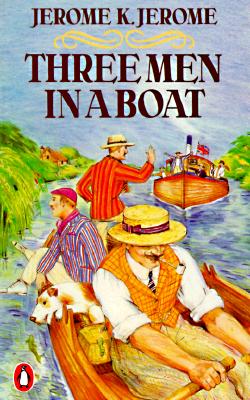We had the river to ourselves, except that, far in the distance, we could see a fishing-punt, moored in mid-stream, on which three fishermen sat; and we skimmed over the water, and passed the wooded banks, and no one spoke.
I was steering.
As we drew nearer, we could see that the three men fishing seemed old and solemn-looking men. They sat on three chairs in the punt, and watched intently their lines. And the red sunset threw a mystic light upon the waters, and tinged with fire the towering woods, and made a golden glory of the piled-up clouds. It was an hour of deep enchantment, of ecstatic hope and longing. The little sail stood out against the purple sky, the gloaming lay around us, wrapping the world in rainbow shadows; and, behind us, crept the night.
We seemed like knights of some old legend, sailing across some mystic lake into the unknown realm of twilight, unto the great land of the sunset.
We did not go into the realm of twilight; we went slap into that punt, where those three old men were fishing. We did not know what had happened at first, because the sail shut out the view, but from the nature of the language that rose up upon the evening air, we gathered that we had come into the neighbourhood of human beings, and that they were vexed and discontented.
Harris let the sail down, and then we saw what had happened. We had knocked those three old gentlemen off their chairs into a general heap at the bottom of the boat, and they were now slowly and painfully sorting themselves out from each other, and picking fish off themselves; and as they worked, they cursed us—not with a common cursory curse, but with long, carefully-thought-out, comprehensive curses, that embraced the whole of our career, and went away into the distant future, and included all our relations, and covered everything connected with us—good, substantial curses.
Harris told them they ought to be grateful for a little excitement, sitting there fishing all day, and he also said that he was shocked and grieved to hear men their age give way to temper so.
But it did not do any good.
George said he would steer, after that. He said a mind like mine ought not to be expected to give itself away in steering boats—better let a mere commonplace human being see after that boat, before we jolly well all got drowned; and he took the lines, and brought us up to Marlow.

